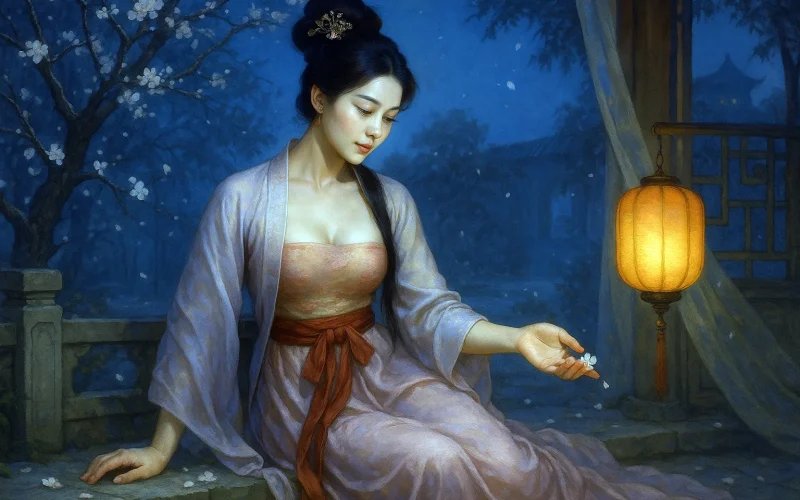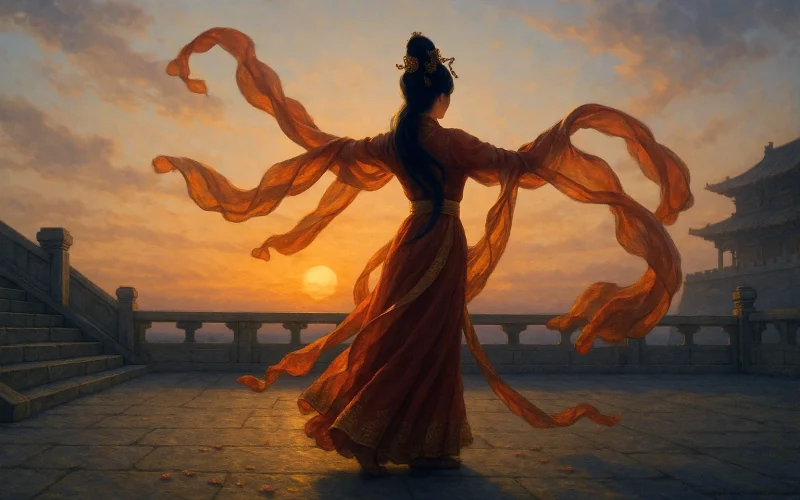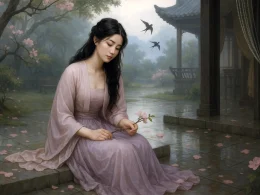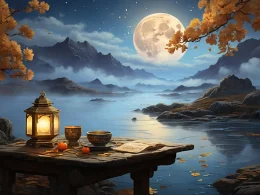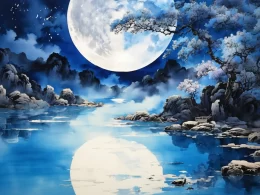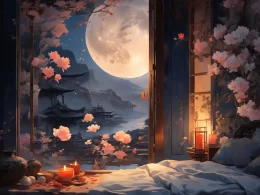In the new year, fragrant mume trees stand,
Their blooms abound on every hand.
The spring wind blows them away day by day,
Overnight, how many branches are left bare, pray?
The young wife now feels just the same,
Her endless regret stretches to the Great Wall's frame.
Oh, never compare the snow on Liao Sea's shore,
To the blossoms falling in her own backyard anymore.
Original Poem
「梅花落」
刘方平
新岁芳梅树,繁花四面同。
春风吹渐落,一夜几枝空。
少妇今如此,长城恨不穷。
莫将辽海雪,来比后庭中。
Interpretation
This poem was composed during the Tianbao era of Emperor Xuanzong of Tang. Although the Tang Dynasty appeared prosperous on the surface, signs of internal decline had already emerged. The ambitious emperor frequently launched military campaigns, and continuous wars in Liaodong, Hexi, and other regions led to the conscription of a large number of young men, resulting in family separations and leaving wives alone at home with unresolved resentment. Liu Fangping often drew on social realities, using natural imagery to express the melancholy and loneliness in women's lives. This poem is one of his representative works—outwardly describing the blooming and falling of plum blossoms, it conveys a young wife's sorrow and protest against the turmoil of war, reflecting deep social concern.
First Couplet: "新岁芳梅树,繁花四面同。"
Xīn suì fāng méi shù, fán huā sìmiàn tóng.
With the new year, the scented plum tree blooms,
Flowers flourishing gloriously on every side.
The opening depicts the plum blossoms in full bloom. Instead of portraying the delicate and sparse elegance of plum blossoms, the poet emphasizes their lush and vibrant beauty through words like "scented" (芳 fāng) and "flourishing" (繁 fán). This reflects the High Tang preference for richness and intensity in aesthetics, while also foreshadowing the "gradual fall" in the following lines. The peak of bloom signals the beginning of decline, hinting at the fleetingness of prime years.
Second Couplet: "春风吹渐落,一夜几枝空。"
Chūnfēng chuī jiàn luò, yī yè jǐ zhī kōng.
The spring wind blows, and petals gradually fall;
Overnight, several branches are left bare.
This couplet shifts from prosperity to decay, highlighting the vulnerability of the plum blossoms. "Gradually fall" (渐落 jiàn luò) and "several branches bare" (几枝空 jǐ zhī kōng) create a strong visual imagery, conveying the impermanence of beauty. This is not merely a description of scenery but also mirrors the young wife’s fear of fading youth, symbolizing how青春 (qīngchūn, youth) and beauty are difficult to preserve over time.
Third Couplet: "少妇今如此,长城恨不穷。"
Shàofù jīn rúcǐ, chángchéng hèn bù qióng.
The young wife is now like this—
Resentment for the Great Wall never ends.
Transitioning from nature to human emotion, the poem reveals its core theme. The blooming and falling of plum blossoms trigger the wife’s reflection: her youth is fading while her husband is stationed at the distant frontier, their time together lost. "The Great Wall" (长城 chángchéng) here represents border warfare, directly addressing the social context and linking personal sorrow with national turmoil, carrying subtle yet profound social critique.
Fourth Couplet: "莫将辽海雪,来比后庭中。"
Mò jiāng Liáo hǎi xuě, lái bǐ hòu tíng zhōng.
Do not compare the snow of the Liaodong seas
To the fallen petals in my backyard.
The conclusion returns to the imagery of fallen blossoms, closing the poem in a gentle tone. The fallen petals resemble snow, but the wife refuses to compare them to the snowy fields of Liaodong, as that would evoke endless sorrow over her husband’s conscription and their separation. Through metaphor and negation, the poet deepens the melancholic atmosphere, blending scene and emotion with lasting resonance.
Holistic Appreciation
On the surface, this poem describes the blooming and falling of plum blossoms, but it conveys the lament of a wife left alone. The contrast between the plum’s full bloom and rapid fall reflects the transience of youth; the wife’s sigh combined with "resentment for the Great Wall" exposes how wartime conscription shatters family life. The comparison between "Liaodong snow" and "backyard petals" cleverly merges natural scenery with human suffering, subtle yet powerful. The poem integrates scene and emotion, blending the beauty of nature, the intimacy of personal feeling, and the weight of social concern, making a short quatrain both aesthetically rich and socially poignant.
Artistic Merits
- Nature inspiring emotion, feeling within scene: The poet does not merely describe plums but uses their bloom and fall to symbolize the wife’s fading youth, expressing emotion through nature.
- Integration of nature, personal feeling, and social reality: The poem combines the delicacy of nature poetry, the depth of romantic lament, and the relevance of social critique, enriching its thematic weight.
- Vivid contrast and transition: The contrast between full bloom and bare branches, and the shift from the plum’s fragility to "endless resentment for the Great Wall," emphasize the passage of time and the unpredictability of human affairs.
- Subtle and restrained language: The closing negative sentence avoids direct complaint, enhancing the emotional impact and leaving lasting resonance.
- Concision and typical imagery: In just twenty-eight characters, the poem encompasses natural scenery, human reflection, and social criticism, demonstrating the highly condensed artistic power of Tang quatrains.
Insights
This is not only a poem of romantic longing but also a realistic nature ode. It uses the falling plum blossoms to express the fleetingness of youth and the wife’s sorrow to reveal war’s destruction of ordinary families. The poem reminds us: behind the prosperity of a golden age often lies social suffering; the fragility of beauty urges us to cherish the present and reflect on pointless wars. Using the plum’s bloom and fall as a symbol, it merges personal grief with national pain, carrying timeless resonance.
About the Poet
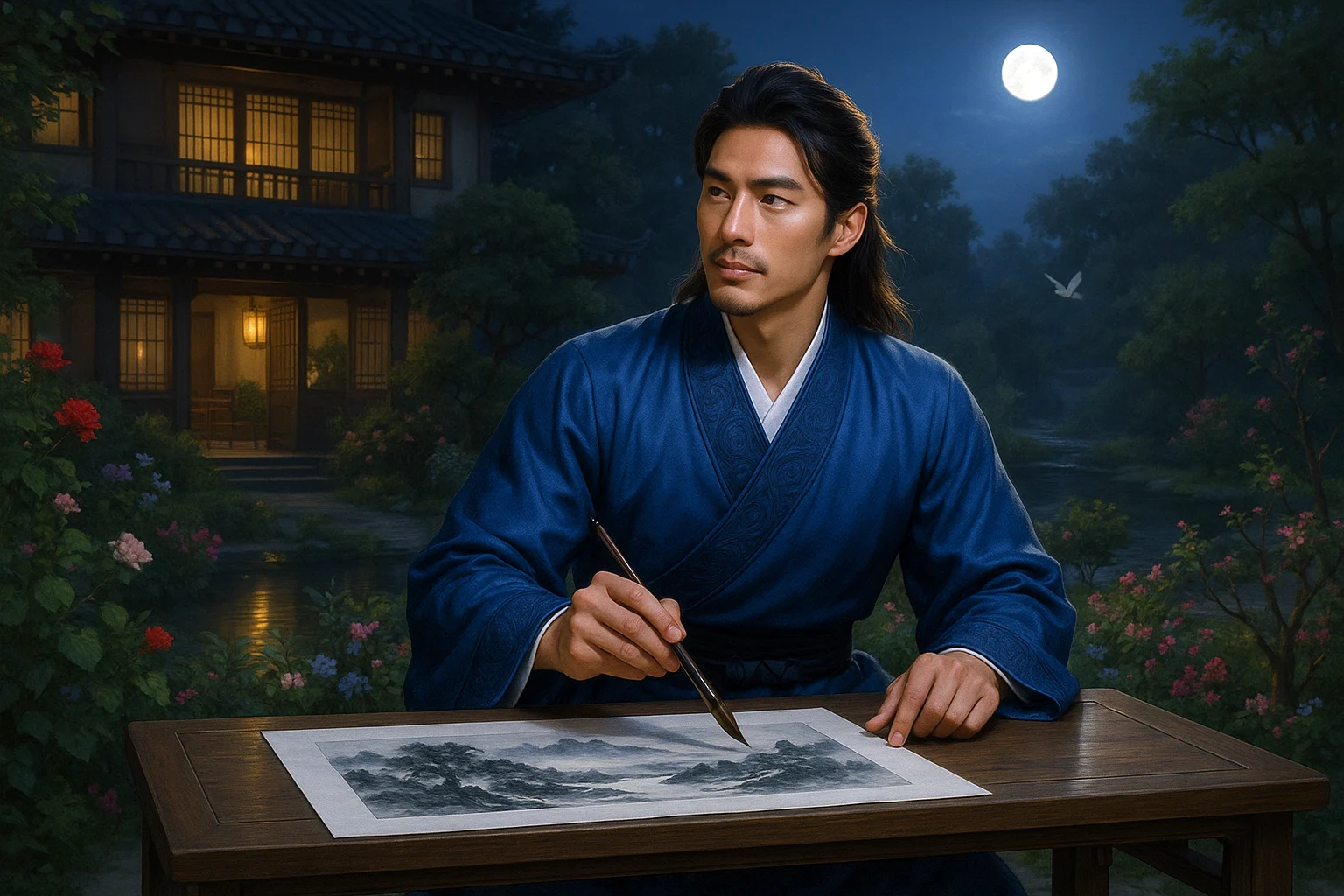
Liu Fangping (刘方平 c. 742 – c. 785), a native of Luoyang in Henan. A recluse-poet and painter spanning the High to Mid-Tang period, he distinguished himself with a delicate and subtle poetic style skilled in depicting boudoir lament and moonlit nights. Though only 26 of his poems survive in the Complete Tang Poems, works like Moonlit Night and Spring Lament secured his place in the canonical hall of Tang poetry. Hailed as "the pure voice of the High Tang and the herald of the Mid-Tang," his poetry fused the lucidity of the Qi-Liang style with Zen serenity, profoundly influencing the later ci lyric tradition and Heian-era Japanese women's literature.






